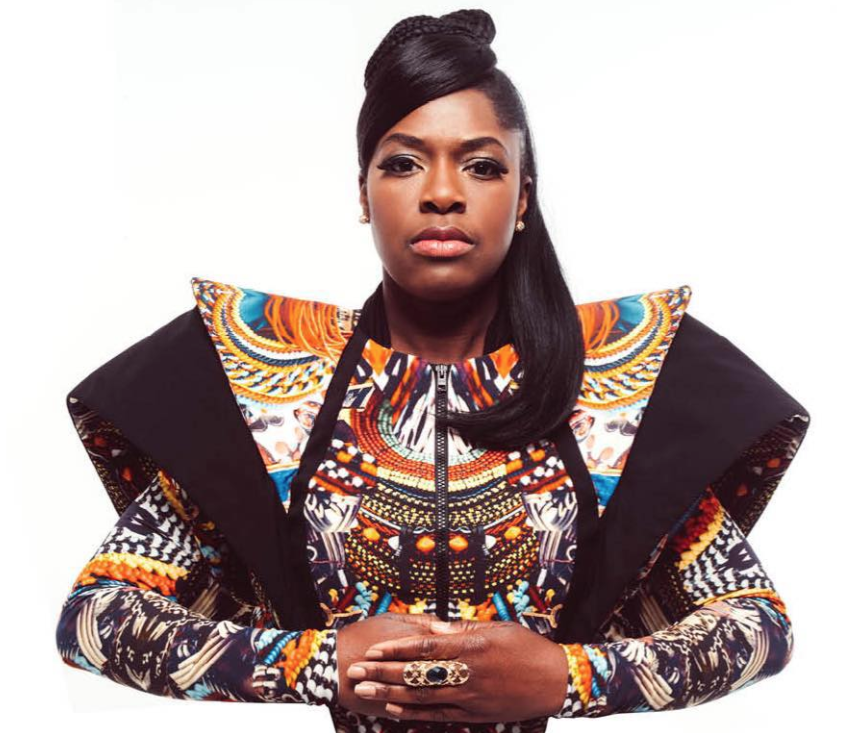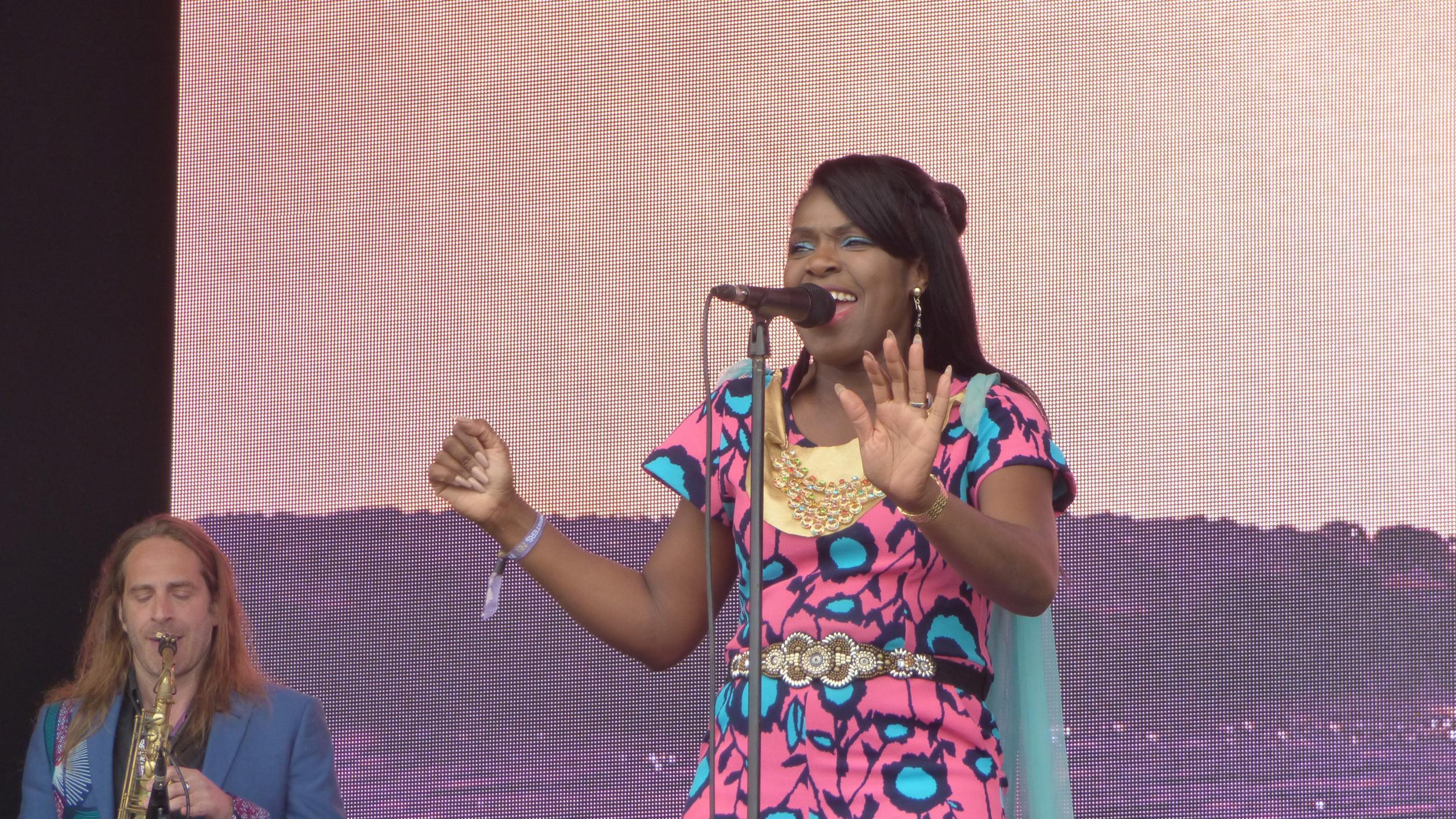Ibibio Sound Machine interview: 'We put out a message of hope and things started to happen'
Frontwoman Eno Williams on language, storytelling, and how togetherness, not division, is what inspires her and the band

The idea of music as a great unifying force is at the very core of Ibibio Sound Machine, a thrillingly dynamic eight-piece band convened from across the continents, fusing delirious Afrobeat and highlife music with the harder edges of funk and electropop.
Their singer and lyricist, the charismatic Eno Williams, is the unifying force of the band, British-born but with her roots in Nigerian culture and the Ibibio people.
I spoke to Williams after a storming set at the Boardmasters Festival in Newquay, where she and the band vaulted the high hurdle of an early-afternoon slot on a dull, overcast day to whip the crowd into ass-shaking fervour.
Given the band’s multinational credentials, and the fact that London was where it all came together, I asked her what she thought of Brexit, which was interpreted largely as a howl of protest against the very globalism that fired the band’s formation.
She refrains from making a direct political statement, but togetherness, not division, is patently what inspires Williams and the band.
“London is a melting pot,” she says, “And I’m not sure it would have happened in another city. And when we’re on stage I look at us, from all different parts of the world, and I think that music has brought us together. And then, on the other hand, globally there are people trying to split us apart. I’m not a politician but I feel that music is one thing that unifies us. It’s a universal language, so we should all be looking to music.”
Conceived in London’s interracial crucible, ISM’s music reflects that universality. “It’s like my grandmother said, when you’re making a pot of stew it takes a lot of ingredients to make it come out tasty and sweet,” says Williams. “We want to push the positive energy and vibes, pump people up and make them happy.”

Her lyrics move between English and Ibibio, her ancestral language. She was born in London, the second eldest of seven sisters, but was raised in Lagos by her mother, grandparents and extended family: “hence I got all the exposure to the Ibibio storytelling – the language is from the south-eastern part of Nigeria – and the culture and heritage.”
Music was a driving force from an early age. She sang with one of her sisters in a quintet that performed in churches, and in school bands. She moved back to London to attend university, studying accountancy and business, and for five years she balanced the books for advertising agencies while singing on the side, doing session work and occasionally touring in musicals.
She began singing with the Australian saxophonist and bandleader, Max Grunhard. As they worked together, he heard some of her Ibibio phrase-making.
“The language is very rhythmic and sing-song,” she says. “I started singing using the phrasing of the stories I’d been told as a child and Max said, ‘Oh wow, that’s musical.”
At the time, Grunhard was leading the Afrofunk outfit KonKoma. The band's legendary highlife guitarist Alfred “Kari” Bannerman – whose CV includes work with Osibisa, Hugh Masekela and Peter Green of Fleetwood Mac fame – joined Grunhard and Williams' new project, together with Brazilian percussionist Anselmo Netto and Trinidadian drummer Jose Joyette. A horn section, all of whom double on synthesisers, was also brought in and the band began playing around with ideas: “One song led to 12 and soon we had an album’s worth of material,” Williamson recalls.
Ibibio Sound Machine's self-titled debut came out in 2014 on the London-based Soundway label, a champion of African music. The Ibibio culture of storytelling shone through: “The Tortoise”, concerns a tortoise who outsmarts a king, while “The Talking Fish” is about just that – a talking fish who becomes a village celebrity. It was, Williams wrote in the album’s liner notes, “a folk tale told to me by elders on moonlit nights while in the countryside as a child.” The stand-out track, “Let’s Dance”, depicts a girl who overcomes the handicap of being denied her rites of passage and finds release in dancing joyously with her friends.
The art of storytelling was instilled in young Eno, “by my mother, my grandmother, my aunties and uncles. Each story had a message behind it. And they weren’t just stories, they were passing on poetry, passing on a tradition.”
Like its predecessor, Uyai (meaning "Beauty"), released in March on the American label Merge Records, is a glorious sonic hybrid. There are flavours of Michael Jackson, Prince, Eighties post-punk and synthpop, not to mention Talking Heads, James Brown – and Gloria Estefan’s Miami Sound Machine, who inspired the band’s name (someone suggested it initially as a joke, but it stuck).
Uyai continues to draw deeply on Williams’ life and heritage, with soulful, contemplative numbers like “Lullaby” – a woman sings her child to sleep with words of wisdom about living a good life – and “The Chant,” in which another woman recalls a chant heard in childhood that helps get her through life’s darker moments.
There is also the stunning “Give Me A Reason”, inspired by the terrible events of April 2014, when 276 schoolgirls were abducted from their school in Chibok by the terrorist group, Boko Haram. A few dozen subsequently escaped, and more were released last October and in May this year, but more than 100 have yet to return to civilisation.
The song, though, while depicting a dark episode in recent Nigerian history, is joyous, even triumphant. It seems odd to craft a fabulously uplifting piece from such a sad tale. “I remember hearing that story, when the girls were taken, and I just remember wondering why can’t we just be free, why should girls be denied an education? And it just got me wondering: give me a reason why. We felt that as sad as it is, we need to be driving a positive message and asking the question, why can’t we be free?
“We put the song out and a few months later, after the album came out, there was news that some of the girls had been released – we put out a message of hope and things started to happen.”
They have played in the US, and across Europe and Asia, but their first opportunity to pass their message on to an African audience came in May this year in Morocco, at the Mawazine Rhythms of the World Festival in Rabat, organised at the behest of King Mohammed VI, and they hope to visit more of the continent soon, especially Williams’ own country, “because that’s where the heritage of our music is from.” There is a lingering distaste for women fronting bands, but an injection of Ibibio Sound Machine into local culture would surely help sweep that away.
Besides the Ibibio folk tradition, another profound influence for Williams is her religion. The Ibibio people, who had always been ruled by a priest-king, were introduced to Christianity in the 19th century by the Ulster missionary, Samuel Bill. A lot of people struggled with it,” said Williams, “and one of the songs on the new album, ‘The Power of Three’, dates back to a story my grandad told me about a missionary trying to explain the concept of the trinity to him.
“In the Ibibio religion there’s the concept of pouring libation on the floor and paying dues to the ancestors. The missionary is telling people it’s all right to do that, but he also wants to introduce them to another kind of spirituality, the power of the trinity and the power of the Holy Spirit. So I’ve tried to incorporate both those things – Christian faith, but also the old traditions, which are still important.”
Christian faith remains a central inspiration for Williams, who still attends church. “We do our own little prayers before we go on stage,” she says, “because as much as we know that we’ve all got the talent and the skill, we like to invite the Supreme Being – something bigger than us – to come and help us, to bring his presence and bring joy. And that’s what I hope people are getting when they’re dancing and being happy and joyful. I hope that’s what we’re passing on.”
Join our commenting forum
Join thought-provoking conversations, follow other Independent readers and see their replies
Comments
Bookmark popover
Removed from bookmarks